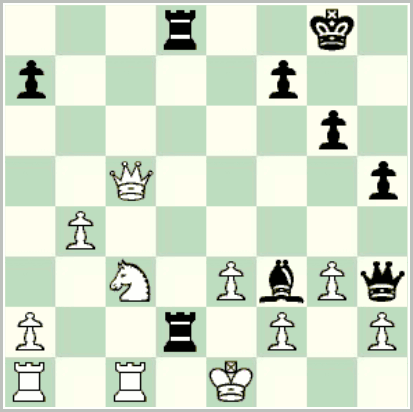Tournament reports have been added for the Bunratty Masters 1999 and 2006 editions. As always, there was much interesting chess in both.
But there were also some puzzling games. Now it must be emphasized that even when a game is available, it isn’t always the full game, and even when all the moves are present, the reason for the game’s end may be missing. For example, sometimes one player loses on time. Or the game continues but both players are short of time, stop recording moves, and one player blunders. Although it’s possible to record all this information, for various reasons it’s often lost in databases.
 In the Bunratty Masters 2006 there was one very striking example. In the first round the English player Robert Kane, as Black against the Dutch FM Peewee Van Voorthuijsen, reached the diagrammed position after 31… Qh3, when the game breaks off. White is utterly lost, e.g. 32. Qb5 Qxh2 33. Qf1 Bg2.
In the Bunratty Masters 2006 there was one very striking example. In the first round the English player Robert Kane, as Black against the Dutch FM Peewee Van Voorthuijsen, reached the diagrammed position after 31… Qh3, when the game breaks off. White is utterly lost, e.g. 32. Qb5 Qxh2 33. Qf1 Bg2.
(Put it this way: Komodo 9.3 evaluates it at -28.45 after 31… Qh3.)
But the result was 1-0!
The version in the ICU games collection ends with “…”, indicating that some moves have been omitted. It would be interesting to see how White could have recovered. Does anyone have information on what exactly happened?

[Event “Bunratty Masters”]
[Site “Bunratty”]
[Date “2006.02.17”]
[Round “1”]
[White “Van Voorthuijsen, Peewee”]
[Black “Kane, R.”]
[Result “1-0”]
[ECO “E00”]
[WhiteElo “2226”]
[BlackElo “2000”]
[Annotator “Van Voorthuijsen,Peewee”]
[PlyCount “93”]
[EventDate “2006.02.??”]
[EventType “swiss”]
[EventRounds “6”]
[EventCountry “IRL”]
[SourceDate “2000.01.01”]
[SourceVersionDate “2000.01.01”]
1. d4 Nf6 2. c4 e6 3. g3 Bb4+ 4. Bd2 Bxd2+ 5. Qxd2 d5 6. Bg2 O-O 7. Nf3 c5 (
7… Nbd7 8. O-O c6 9. Qc2 (9. Rc1 Qe7 10. Qe3) 9… b6 10. Nbd2 Bb7) 8. O-O (
8. cxd5 exd5 9. dxc5 Ne4 10. Qe3) 8… cxd4 9. cxd5 exd5 10. Nxd4 Nc6 11. Nxc6
(11. Nc3 Re8 12. e3) 11… bxc6 12. Qc2 Qb6 (12… Rb8) 13. Nc3 Re8 14. e3 Re5
15. Na4 Qb4 16. Qxc6 Rb8 17. Qc3 (17. Nc5 Qxb2 (17… Re8 18. b3) 18. Nd3)
17… Qe7 18. Rfc1 Bd7 19. Nc5 Bf5 20. b4 (20. Qd4 Re8 21. Rc3 Be4 22. Rac1
Bxg2 23. Kxg2 h6 24. b4 Ne4 25. Nxe4 dxe4 26. Rc7 Qf6 27. Rxa7 Qf3+ 28. Kg1 Rf5
29. Rc2) 20… h5 21. Qd4 Ne4 22. Nd3 Re6 23. Qxd5 (23. Nf4 Re5 24. Nxd5 Qd6
25. Rd1 Rb5 26. Nf4 (26. Bxe4 Bxe4 27. Nc3 Rbd5 28. Nxd5 Rxd5 29. Qxe4 Rxd1+
30. Rxd1 Qxd1+ 31. Kg2 Qa4 32. Qc4) 26… Qxd4 27. Rxd4 Nf6 28. h4) 23… g6
24. Nf4 Rd6 25. Qa5 Rd2 26. Nd5 Qd6 27. Bxe4 $2 (27. Rd1 Rxd1+ 28. Rxd1) 27…
Bxe4 28. Nc3 $4 (28. Nf4 Rxb4 29. Qxa7 Rc4 30. Rf1 Rcc2 31. a4 (31. Qa5 Bb7 32.
h3 Qc6 33. f3 Ba6) 31… g5 32. Nxh5 Bf3 33. g4 Bxg4 34. Ng3 Bf3 35. Qa5) 28…
Bf3 29. Qc5 (29. Qg5 Rxb4 30. Nb5 Qe6 31. Nxa7 Qh3 32. Rc8+ Kg7 33. Qe5+ f6 34.
Qe7+ Kh6 35. Rh8+ Kg5) 29… Qe6 30. Kf1 Rbd8 31. Ke1 Qh3 {[#]} 32. Qc4 Qg2 (
32… Qxh2 33. Qf1 Bg2) (32… R8d3 33. Qxd3 Rxd3 34. Rd1 Rxc3) 33. Qf1 Qxh2
34. Rd1 Bxd1 35. Rxd1 Rxd1+ 36. Nxd1 h4 37. gxh4 Qd6 38. Qe2 Qxb4+ 39. Kf1 Qxh4
(39… Qe4 40. f3 Qb1 41. Ke1 Qb4+ 42. Kf1 Rd2) 40. Qf3 (40. Qc2) 40… Qc4+
41. Kg2 Rd5 (41… Qc2) 42. e4 Rg5+ 43. Kh2 Qc7+ (43… Qf1 44. Ne3 Rh5+ 45.
Kg3 Qh3+ 46. Kf4 g5+) 44. Kh1 Qe5 45. Ne3 Rh5+ (45… Qh8+ {and mate in one…
we must have missed this both.}) 46. Kg2 Qg5+ (46… Rg5+ 47. Kf1 Qb5+ 48. Ke1
Qd3 49. Qh1 Rb5) 47. Kf1 (47. Ng4 Rh4 48. Kg3 Rh8) 1-0
This is as far as I have in my datebase. I guess my opponent lost on time here? As to the earlier part of the game: 27. Le4? and especially 28. Nc3?? convert a very good position into a totally lost one…